Eparchy of Buda
The Eparchy of Buda (Serbian: Будимска епархија or Budimska eparhija) is a diocese or eparchy of the Serbian Orthodox Church, having jurisdiction over the territory of Hungary. The see of the eparchy is in Szentendre (Serbian: Сентандреја or Sentandreja) near Budapest.
Eparchy of Buda Епархија будимска | |
|---|---|
| Location | |
| Territory | Hungary |
| Headquarters | Szentendre (Serbian: Сентандреја) |
| Information | |
| Denomination | Eastern Orthodox |
| Sui iuris church | Serbian Orthodox Church Patriarchate of Peć (Serbia) |
| Established | 16th century |
| Language | Church Slavonic Serbian |
| Current leadership | |
| Bishop | Lukijan Pantelić |
| Map | |
-en.svg.png) | |
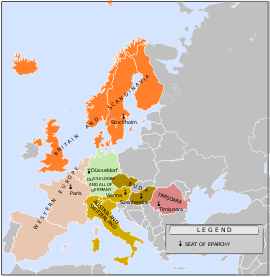
Map of Serbian Orthodox eparchies in Europe, including the Eparchy of Buda
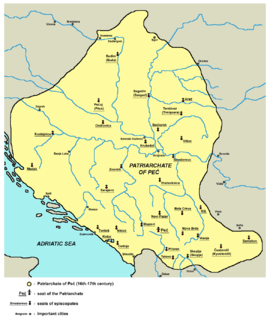
Jurisdiction of Serbian Patriarchate in the 16th and 17th centuries
Name
The term Buda (Serbian: Будим or Budim) in the name of the eparchy refers to the name of the former city of Buda, which merged with the city of Pest to form the modern city of Budapest in 1873. That change did not affect the eparchy and the original name has been kept to the present day.[1]
History
Early Christianity in Pannonia
Christianization of Slavs in Pannonia
Orthodox Christianity in Kingdom of Hungary
Serbian Eparchy of Buda under Turkish Rule
Serbian Eparchy of Buda under Habsburg Rule
Serbian Eparchy of Buda in Modern Hungary
Bishops
List of Serbian Orthodox Bishops of Buda:
- Sevastijan (†1662);
- Simeon (around 166?);
- Viktor (1660—1668 and 1680—1684);
- Kiril (1668—1680);
- Jeftimije Popović (1695—1700);
- Vikentije Popović-Hadžilavić (1708—1713);
- Mihailo Milošević (1716—1728);
- Vasilije Dimitrijević (1728—1748);
- Dionisije Novaković (1749—1767);
- Arsenije Radivojević (1770—1774);
- Sofronije Kirilović (1774—1781);
- Stefan Stratimirović (1786—1790);
- Dionisije Popović (1791—1828);
- Stefan Stanković (1829—1834);
- Justin Jovanović (1834);
- Pantelejmon Živković (1836—1839);
- Platon Atanacković (1839—1851);
- Arsenije Stojković (1852—1892);
- Lukijan Bogdanović (1897—1908);
- Georgije Zubković (1913—1951);
- Hrizostom Vojinović (1951—1952);
- German Đorić (1952—1956);
- Arsenije Bradvarević (1960—1963);
- 1963-1988 various administrators;
- Danilo Krstić (1988—2002, admin. 1984—1988);
- Lukijan Pantelić (2002-present).
Monasteries
- Serbian Orthodox Monastery of Grabovac (Grábóc)
- Orthodox Monastery of Serbian Kovin (Ráckeve)
Gallery
_(7388._sz%C3%A1m%C3%BA_m%C5%B1eml%C3%A9k)_4.jpg) The Serbian Orthodox Cathedral in Szentendre
The Serbian Orthodox Cathedral in Szentendre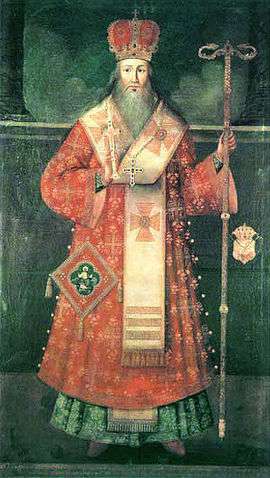 The Serbian Patriarch Arsenije III
The Serbian Patriarch Arsenije III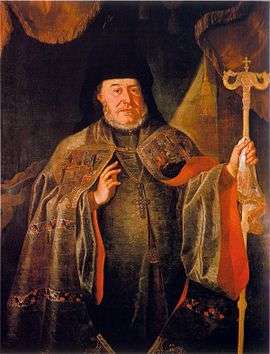 The Serbian Patriarch Arsenije IV
The Serbian Patriarch Arsenije IV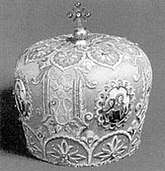 The mitre of Arsenije Stojković, Serbian Orthodox Bishop of Buda
The mitre of Arsenije Stojković, Serbian Orthodox Bishop of Buda The previous co-cathedral, the Church of Saint Demetrius in Buda
The previous co-cathedral, the Church of Saint Demetrius in Buda
See also
References
- Kašić 1966, pp. 10.
Sources
- Kašić, Dušan, ed. (1966). Serbian Orthodox Church: Its past and present. 2. Belgrade: Serbian Orthodox Church.CS1 maint: ref=harv (link)
- Вуковић, Сава (1996). Српски јерарси од деветог до двадесетог века (Serbian Hierarchs from the 9th to the 20th Century). Евро, Унирекс, Каленић.CS1 maint: ref=harv (link)
- Ćirković, Sima (2004). The Serbs. Malden: Blackwell Publishing. ISBN 9781405142915.CS1 maint: ref=harv (link)
- Fodor, Pál; Dávid, Géza, eds. (2000). Ottomans, Hungarians, and Habsburgs in Central Europe: The Military Confines in the Era of Ottoman Conquest. BRILL. ISBN 9004119078.CS1 maint: ref=harv (link)
External links
This article is issued from Wikipedia. The text is licensed under Creative Commons - Attribution - Sharealike. Additional terms may apply for the media files.